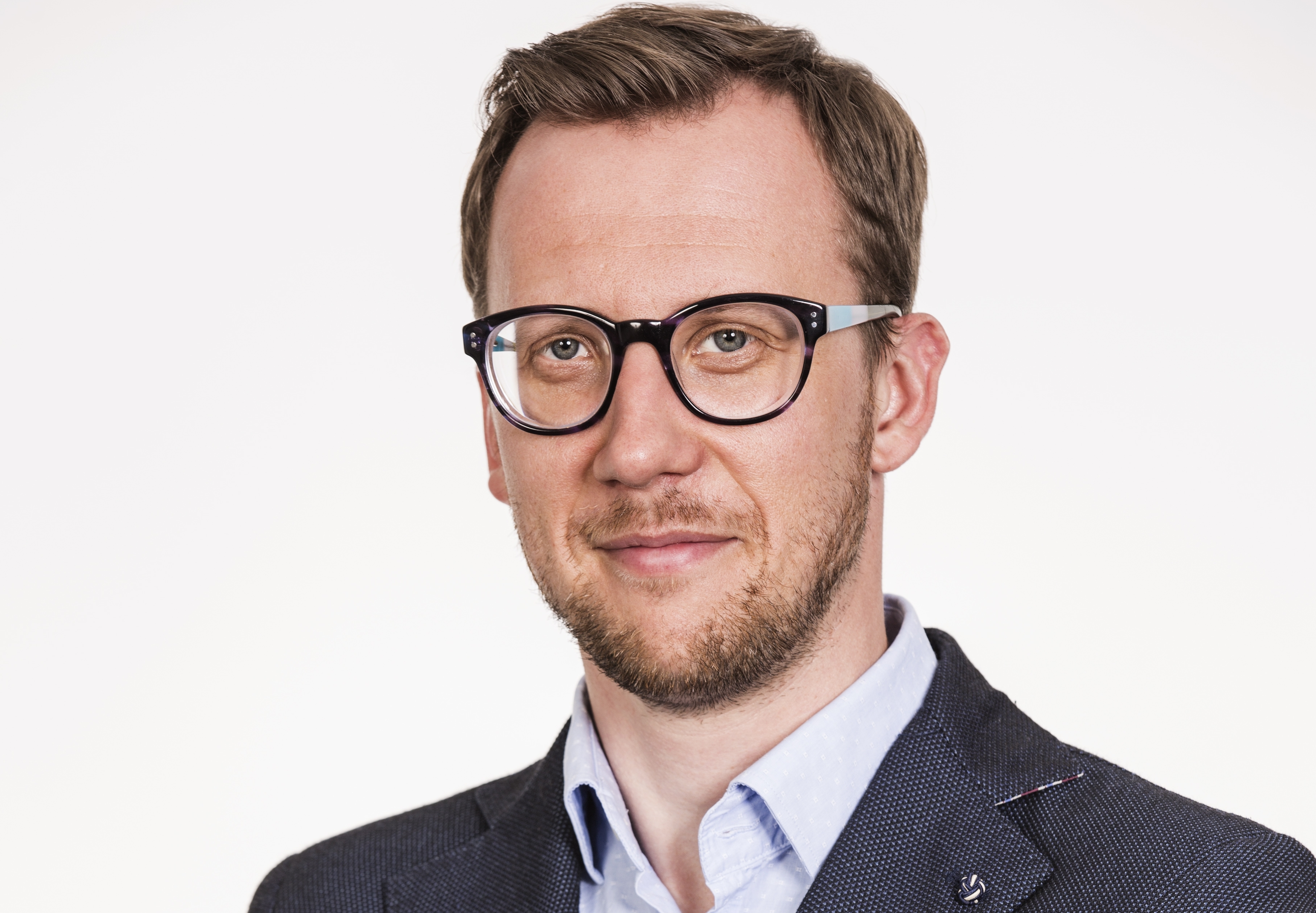“Every day I scout for the most transformative products and services in healthcare innovation,” says Mikołaj Gurdała, innovation manager at EIT Health Innostars.
A European network of top companies, start-ups, universities, research and development centres, as well as hospitals and institutes, EIT Health’s role is to build an ecosystem that enables the development of healthcare for the future so that European citizens can live longer and healthier lives. It is therefore no surprise that EIT Health and Mr Gurdała are strong advocates of value-based healthcare across all European healthcare regions, including those considered as more progressive in terms of innovative healthcare.
“We are not trying to focus just on what healthcare costs, but on what the outcome is for the patient,” Mr Gurdała tells Emerging Europe. “For the patient it is much more important to stay healthy for as long as possible, as the cost is lower. On the other hand, when the patient does enter the healthcare system at any point it is important they get the best outcome, and that outcome has to be measured.”
This is where value-based healthcare comes in.
The movement is based on the work of Harvard University Professor Michael Porter, whose landmark book, Redefining Health Care Creating Value-Based Competition on Results, co-authored with Elizabeth O. Teisberg, was published in 2006 following 10 years of research into why the healthcare industry did not conform to the principles of competition seen in all other sectors of the economy.
Since then, value-based healthcare has quickly become one of the most important topics in health care transformation. Value-based approaches to organising healthcare delivery are widely touted as critical to improving the health outcomes of patients worldwide and controlling costs. Value-based healthcare’s central tenant is that value for patients must be the overarching principle in the organisation and management of health care delivery systems. Value is defined as the outcomes that matter to patients and the costs to achieve those outcomes.
The way that Gurdała sees it, payment for healthcare, whether it is made by patients, insurers, or governments, should reflect value and not volume. Networks of care that perform the right services, at the right location, and with the right people, are essential.
One of most tangible ways in which EIT Health is bringing about the shift to VBHC is through its recently published handbook which explains, using a step-by-step approach and offering examples of best practice, how healthcare stakeholders can put value at the core of the processes.
“Our VBHC handbook for pioneers describes precisely the VBHC model and process and is based on more than 200 interviews with healthcare practitioners,” says Mr Gurdała.
“VBHC is all about process,” he adds. “We are trying to transform the healthcare system, transforming not just the approach of providers and also the way patients think about their health. But you have to make the theory actionable. So, what we have done is introduce an implementation framework. This helps to translate Professor Porter’s ideas into practice.”
As an incubator for innovation, VBHC is a perfect fit for EIT Health Innostars. “We do some analysis but we are not a university, we are not a research organisation. What we do is boost innovation, we co-finance projects that are perhaps too risky for companies to implement on their own as they might not always fit their core business,” adds Mr Gurdała.
EIT Health started to talk to organisations involved in VBHC – such as universities and research institutions – in 2018, and began spreading the word amongst the regions in which it works. As a result, providers of healthcare have started to look with more courage at VBHC, and the need to put the patient at the core of the process.
“The payers, such as the insurance companies, started to ask us what kind of different models can they introduce in healthcare? Can we calculate the costs in a different way?,” says Mr Gurdała, who points out that cheaper solutions are not always the best, as they could lead to patients having to re-enter the healthcare system shortly afterwards, if initial treatment is not effective.
EIT Health has seen considerable success in helping start-ups bring their innovative solutions to the market, not least because, as Mr Gurdała puts it, “we engage patients in most of our projects and activities.”
“If you are a small start-up and want to offer something that is patient-centred and will have a huge impact as well as create savings, you will often meet regulatory roadblocks because they are too innovative for rigid healthcare systems,” he says. “We show the start-ups how they can introduce their innovations practically. We put them in front of payers, and the start-up convince them that their project can not only bring revenues for the start-up, but can also help to really change the healthcare system and improve the outcomes for patients, lowering the cost burden for the entire system. It is about creating a joint mindset, so that payers, regulators and innovators are on the same page.”

While innovation is at the core of VBHC, Mr Gurdała warns that it should be carefully targeted.
“There has to be a focus. You can’t shoot for the moon and reform the whole system in one go,” he says.
This is where microscale is important. “All you need to start is a small hospital in your town – in Poland or Hungary for example – with teams who know how to do their job well. If your solution works for 20 or 30 patients you will then be able to convince a bigger investor from Warsaw or Berlin to invest in your venture. What’s important is that you start somewhere. Start-ups who create a small hub based around a good, motivated clinical team, and can show real results based on real data will achieve more than others who come up with a great pitch and simply head off for start-up competitions with no data.”
Although the concept of value-based healthcare was initially created to address the issue of crippling costs in the US health system, Mr Gurdała is convinced that it is crucial for the future of emerging Europe, where, as he says, “every zloty counts.”
“VBHC can help these health systems become much more effective. The way that costs are calculated is key,” he says.
One of the most effective VBHC programmes to be introduced in the region has been in Poland, in the field of cardiology.
With historically strong research teams and great heart surgeons, Poland has long been a pioneer in the field, and adopted VBHC quite early. As a result, the mortality rate has decreased, by ensuring that resources are used in the best-value way, “for example by ensuring that only the most severe cases are moved from local hospitals to larger regional hospitals,” says Mr Gurdała.
“This is important because Poland is ageing fast. And now I see that the regulators, the government, are becoming more open to the way they view new technology. They are beginning to see that we have no other choice but to take a more value-based approach. After all, if people are healthy, they can work, they can be active. And in CEE this is important because of the demographic trends.”
Life expectancy is indeed a key element and as Mr Gurdała explains this just does not just mean pouring money into the system. “We may have to do this, but it is also about how the money is spent and then what happens to the savings. Are they reinvested in the system? Many hospitals tell me that they cannot keep the money they save, which makes them keen carry on with expensive procedures because they know they will be reimbursed for them.”
For Mr Gurdała, decentralising healthcare in emerging Europe is an important step that needs to be taken. He points to the European leaders in VBHC, Sweden, Denmark, Norway, the Netherlands, where healthcare is regionalised as much as possible. It means that patients get more satisfactory outcomes because treatment and processes are based on local know-how, on specific regional demographics. “Regional governments know what is best for their inhabitants,” he says.
Another problem that crops up in the emerging Europe region is access to data: the authorities are not always keen to make it available. This is in stark contrast with Israel, for example, where as soon as it becomes clear that an innovative healthcare solution could be in the national interest, its developers get access to all the data they need. “It’s why they can develop solutions so fast,” says Mr Gurdała.
“We have to mobilise more stakeholders in countries such as Poland and Hungary to invest. And that investment is not just about cash, money is important, but investment is also about human resources, mobilising institutions to look at innovation, sharing data. EIT Health wants to bring all of these stakeholders together to make sure these innovations end up on the market.”
Mr Gurdała believes that the ongoing Covid-19 pandemic may help to focus a few minds and speed up the transformation process.
“There has been a huge breakout of innovations, mostly linked to Covid, but we are also seeing more digital solutions emerging,” he says. “Covid-19 will accelerate the cause of value-based healthcare. Whether it’s a second wave or whether it’s a new virus we have to be prepared for it. The reaction to Covid-19 has shown that you do not years to develop new solutions: they can be developed in weeks. Healthcare is complex, but sometimes simple solutions, small changes, can have a huge impact. We need courage, to realise that if we really want to, we can change things.”
—
Unlike many news and information platforms, Emerging Europe is free to read, and always will be. There is no paywall here. We are independent, not affiliated with nor representing any political party or business organisation. We want the very best for emerging Europe, nothing more, nothing less. Your support will help us continue to spread the word about this amazing region.
You can contribute here. Thank you.








[…] Source: emerging-europe […]
[…] Emerging Europe must shift towards value-based healthcare […]
[…] Emerging Europe must shift towards value-based healthcare […]
[…] Emerging Europe must shift towards value-based healthcare […]